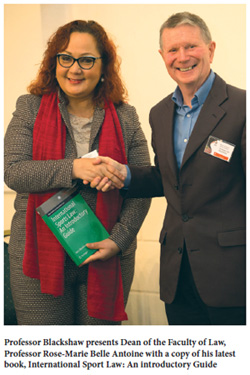 |
 |
 |
|
May 2018
|
“Sport is now an industry in its own right and worth more than 3% of world trade. It is not surprising therefore, that a specific body of sports law – a so-called Lex Sportiva – is developing to deal with this global phenomenon. There is now so much at stake, on as well as off the field of play. This has led to pressures – sporting and financial ones – on sports persons and teams to compete vigorously and, in some cases, to do so at all, or any costs, including cheating in its various forms, such as doping, match-fixing, illegal betting and other forms of corruption that are undermining the integrity of sport.” These are comments by Professor Ian Blackshaw, the feature speaker at the UWI Faculty of Law’s first sports law workshop. Prof Blackshaw gave two presentations: “Sports Governance and the Russian Dilemma: Welcomed by FIFA, banned by the IOC” and “Sports Disputes Resolution: The Role of the Court of Arbitration for Sport and Lessons for the Caribbean.” Prof Blackshaw is a Solicitor of the Supreme Court of England and an international sports lawyer with over 30 years' experience. He is a prolific author of books and articles on sports law, including his latest book entitled International Sports Law: An Introductory Guide published by the Asser Press in The Hague, The Netherlands. He is a member of the Court of Arbitration for Sport (CAS), where he specializes in sports mediation and conciliation. In many respects, he is a pioneer in the practice and teaching of sports law, which, he says, is an ongoing, developing and ever-challenging branch of the law. He touched on several sports issues, including the controversies surrounding the granting of the World Cup to Russia (coming up in June this year), and later on, to Qatar in 2022. He gave several examples of fraud in sport, such as doping –a form of cheating that is anathema to the ideals of fair play. In the sport of cycling, he noted that “mechanical doping” or the concealing of motorized equipment in the frames or wheels of bicycles was an issue of technological fraud. A recent example from cricket was the issue of ball tampering by Australians in the Third Test Match in Cape Town. And even the genteel sport of tennis is also under the microscope for being lenient with people alleged to be using prohibited substances, he said. So what are international sports bodies doing about these issues? He discussed the International Olympic Committee’s introduction (following the 2002 Salt Lake City bidding scandals) of an independent Ethics Committee, which has now been divided into two bodies following the allegations of systemized doping by Russia in relation to the 2014 Winter Olympic Games in Sochi. In the wake of FIFA’s corruption scandals, he noted that FIFA has established its own independent ethics committee, with investigatory and adjudicatory arms. He commented on the demise of Sepp Blatter as president of FIFA, and the fall of Michel Platini (who in 2015 was banned from all football-related activities for eight years for accepting a payment of two million Swiss francs from Sepp Blatter). On the issue of illegal betting, Prof Blackshaw noted that on May 9, 2011 FIFA signed a 10-year collaboration agreement with Interpol to try to identify illegal betting patterns: FIFA has put 20 million Euros into this collaboration, he said, which was significant, because Interpol has almost 200 member countries around the world. He also spoke of several bodies set up to police or regulate different aspects of sports, including the ESSA (European Sports Security Association, based in Brussels, Belgium, set up to identify irregular sports betting patterns); and the ICSS (International Centre for Sports Security, based in Doha, Qatar, which does event security design, and provides services in good governance, investigations and intelligence).The ICSS aims to galvanise international support for integrity in sport globally, he said. Prof Blackshaw also spoke of SIGA (Sport Integrity Global Alliance), formed in November 2015, a not-for profit international private-public partnership aimed at fixing many governance challenges in sport. In his second presentation, he discussed the work of CAS, which has played an important role in developing the field of sports law since it began operations on 30 June 1984, having been specifically set up to settle sports-related disputes outside the ordinary courts' system, in other words, “extra-judicially”. Such a form of alternative dispute resolution, Prof Blackshaw pointed out, saves time and money and enables disputes to be settled “within the family of sport.” (Shereen Ali) |


